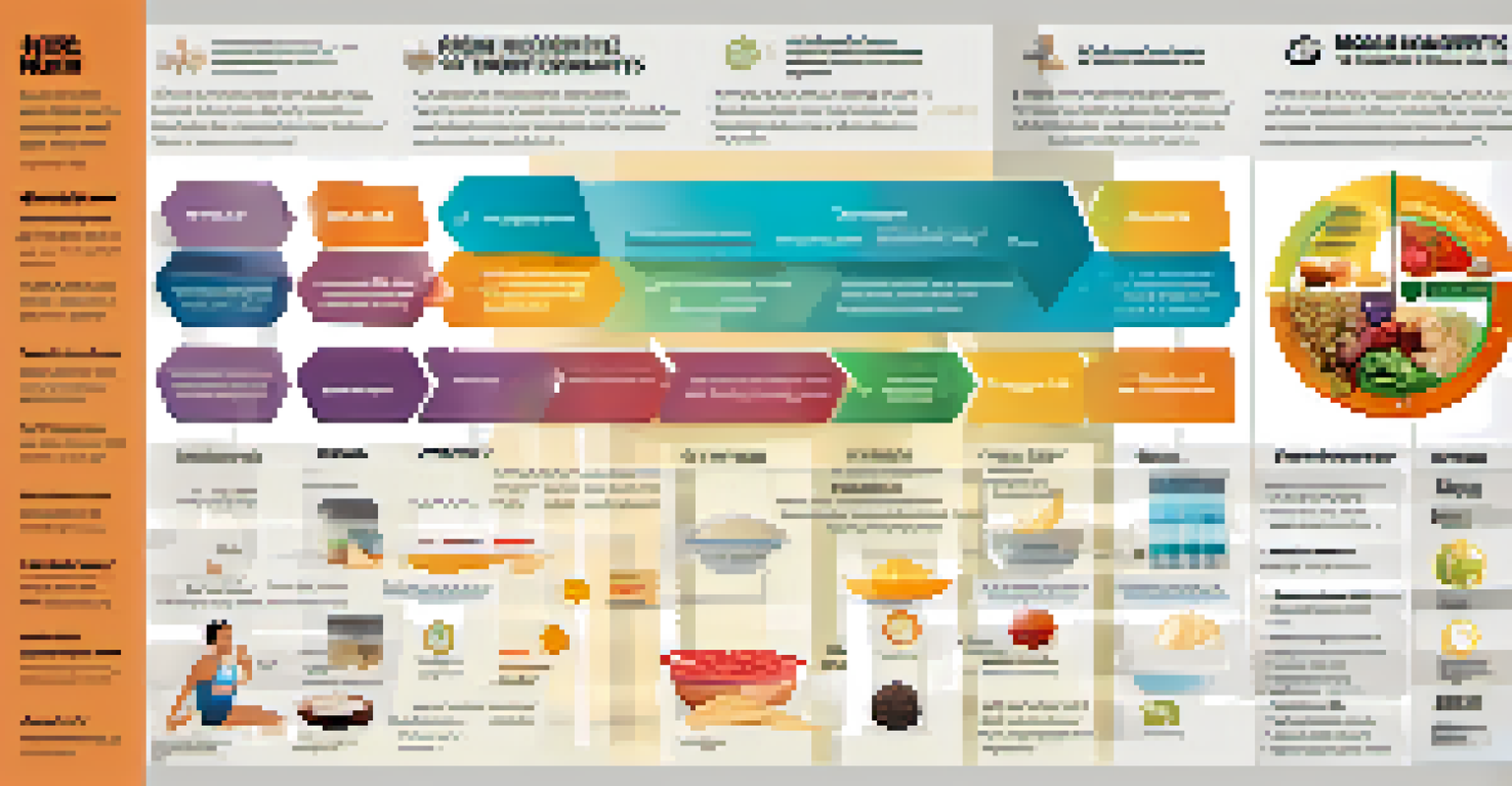Nutrition Coaches: Key to Powerlifting Performance Improvement

Understanding the Role of Nutrition in Powerlifting
Nutrition plays a critical role in powerlifting, influencing strength, recovery, and overall performance. Proper fueling allows athletes to maximize their training sessions and achieve their lifting goals. A well-balanced diet tailored to individual needs can help powerlifters perform at their peak during competitions.
Nutrition is a key factor in achieving athletic performance. It can make or break a workout.
For example, consider a lifter who consumes a diet rich in protein, carbohydrates, and healthy fats. This approach not only supports muscle repair but also provides the necessary energy to tackle heavy lifts. Nutrition is not just about what you eat; it's about timing and the quality of those nutrients as well.
Ultimately, understanding the relationship between nutrition and performance can set the foundation for success in the sport. This is where nutrition coaches come into play, offering expertise and guidance to help athletes optimize their diets for better results.
How Nutrition Coaches Personalize Diet Plans
One of the standout benefits of working with a nutrition coach is the personalization of diet plans. Each athlete has unique needs based on their body type, metabolism, and training goals. A nutrition coach evaluates these factors to create a tailored eating strategy that supports performance and recovery.

For instance, a powerlifter looking to increase muscle mass will require a different caloric intake and macronutrient distribution compared to one aiming for weight class management. By customizing meal plans, nutrition coaches ensure that athletes are receiving appropriate nutrients that align with their specific goals.
Nutrition Fuels Powerlifting Success
Proper nutrition enhances strength, recovery, and performance for powerlifters.
Personalization doesn’t stop at the food choices; it extends to meal timing and frequency as well. A nutrition coach can help strategize when to eat to maximize energy levels during training and recovery, leading to improved overall performance.
The Importance of Macronutrients for Lifters
Macronutrients—proteins, carbohydrates, and fats—are the building blocks of nutrition, especially for powerlifters. Each plays a vital role in fueling workouts, aiding recovery, and supporting muscle growth. A nutrition coach can help athletes understand how to balance these macronutrients to meet their specific lifting goals.
You are what you eat, so don't be fast, cheap, easy, or fake.
For instance, adequate protein intake is crucial for muscle repair and growth, while carbohydrates provide the energy needed for intense training sessions. Healthy fats also play a role in hormone production and overall health, making them an essential part of any powerlifter's diet.
By working with a nutrition coach, athletes learn to track their macronutrient intake effectively, ensuring they are not only meeting but exceeding their dietary needs for optimal performance.
Hydration: A Key Component of Performance
Hydration is often overlooked but is a vital part of any nutrition plan for powerlifters. Dehydration can lead to decreased strength, endurance, and concentration, all of which are detrimental during heavy lifting sessions. Nutrition coaches emphasize the importance of maintaining proper hydration levels to support overall performance.
Imagine trying to lift a heavy weight while feeling sluggish and fatigued; that’s what dehydration can do. A coach can guide athletes on how much water to consume based on their body weight, activity level, and environmental conditions. This ensures lifters stay energized and focused.
Personalized Diet Plans Matter
Nutrition coaches customize meal plans to meet individual athlete needs and goals.
In addition to water, nutrition coaches can advise on electrolyte balance, which is crucial for muscle function and recovery. By incorporating hydration strategies into their routines, athletes can significantly enhance their lifting capabilities.
Nutrition Timing: Fueling for Performance
Nutrition timing refers to when you consume certain nutrients to optimize performance and recovery. For powerlifters, understanding how to time meals can make a significant difference in their training outcomes. A nutrition coach can provide strategies for pre- and post-workout nutrition that maximize energy and recovery.
For instance, consuming carbohydrates and protein before a workout can provide the necessary fuel for lifting, while post-workout nutrition helps replenish glycogen stores and repair muscles. This strategic approach ensures athletes are always performing at their best.
By focusing on nutrition timing, athletes can avoid fatigue during workouts and facilitate quicker recovery afterward. A well-timed meal can be the difference between a mediocre session and a personal best.
The Psychological Impact of Nutrition Coaching
Nutrition coaching goes beyond just meal plans; it also addresses the psychological aspects of eating. For many athletes, the pressure to perform can lead to unhealthy eating habits or anxiety around food choices. A nutrition coach can provide support and education, helping powerlifters develop a healthy relationship with food.
For instance, understanding that food is fuel and not just a source of pleasure can shift an athlete's mindset. This shift can lead to improved focus on their training and lifting goals. Coaches often use motivational techniques to empower athletes to make better dietary choices.
Hydration and Timing Boost Performance
Maintaining hydration and timing nutrient intake are crucial for optimal lifting performance.
Ultimately, this psychological support can enhance an athlete's overall performance and well-being. When lifters feel confident in their nutrition, they can fully concentrate on their training and competitions.
Success Stories: Real-Life Impact of Nutrition Coaches
Many powerlifters have experienced remarkable transformations by incorporating nutrition coaching into their training regimens. These success stories often showcase how tailored diet plans have led to improved performance, increased strength, and personal bests. Hearing these stories can inspire others to consider working with a coach.
For example, a lifter who struggled with weight management might find that a nutrition coach helps them achieve their desired weight class without sacrificing strength or energy. This not only boosts their performance but also their confidence in the sport.

These real-life examples serve as powerful testimonials to the value of nutrition coaching. They highlight how a structured and informed approach to nutrition can lead to significant improvements in a powerlifter’s journey.